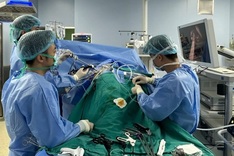Vietnam has seen increasing resistance to antibiotics in recent years, posing a greater risk to patients.

Drug resistance prolongs treatments
A report by the Global Antibiotic Resistance Partnership-Vietnam project last October indicated that Ho Chi Minh City recorded only 8% of penicillin-resistant pneumococcus in the 1990s. However, the figure had soared to 56% in the 1999-2000 period.
The same situation has been reported in several localities in northern Vietnam.
Threats
According to Minister of Health Nguyen Quoc Trieu, drug and especially antibiotic resistance is on the rise and posing an increasing threat to the treatment of infectious diseases.
The World Health Organisation (WHO) Representative Office in Vietnam blamed rising drug resistance on both patients and medical staff.
Patients in Vietnam often self medicate without official prescriptions, while medical staff tend to provide inaccurate doses, either over or under-prescribing. Pharmarcists are happy enough to sell drugs without a prescription.
According to the WHO, antibiotic resistance may have serious consequences for both patients and society. Increased antibiotic resistance could render usual drug treatments useless, prolonging treatment times and posing greater risks for patients.
Antibiotic resistance also allows drug-resistant bacteria to more rapidly spread, which may cause further drug resistance even to simple infectious diseases, the WHO warned.
Ministry of Health research at 19 hospitals in Hanoi, Haiphong and HCM City during the 2009-2010 period revealed that four types of bacteria (acinetobacter spp, pseudomonas spp, e.coli, and klebsiella) had become resistant to several antibiotics, including penicillin and tetracycline.
Additional research into antibiotic resistance among elderly patients by the Hanoi-based Bach Mai Hospital indicated that antibiotics were the main cause of drug allergies. Oral drug allergies accounted for nearly 80% of antibiotic resistant cases.
Challenges
Doctor Nguyen Van Vinh Chau, Director of the Ho Chi Minh City-based Hospital of Tropical Diseases, said, “Many patients have become resistant to several antibiotics, including ampicillin and amoxicillin, when they are hospitalised. This is because many of them often buy these antibiotics at pharmacies and stop using them after the first doses, creating drug resistance. Some patients suffering from diarrhoea use ampicillin, amoxicillin and bactrim at the same time, forcing us to switch to using a new generation of drugs for treatment. New drugs mean higher medical spending and longer treatment periods.”




















